One ugly truth on becoming an AI/ML Engineer!
A few Engineering & ML books I recommend. Video Courses, Resources and what works for me when reading and studying.
Hey there,
This article is slightly different as it doesn’t necessarily cover technical concepts or code, but I think you’ll find it useful. In this one, I’ll list courses and books and share insights and images of how I study drafts, make project plans, etc. - insights you might take and apply to your learning process.
First, I want to share a few ideas on the learning process.
Learning is not supposed to be fun
Exactly one year ago, Andrej Karpathy tweeted a few notes on “learning not being fun, which stuck with me because I agreed with those lines.
In summary, here are interesting 3 points that I’m sure we all know:
There are a lot of videos on YouTube/TikTok etc. that give the appearance of education, but if you look closely they are really just entertainment.
The people creating this content also enjoy it because fun has a much larger audience, fame and revenue.
Unless you are trying to learn something narrow and specific, close those tabs with quick blog posts.
I’ve been writing technical articles for the past year, and I’m still refining my approach to them. After 8 years in ML, I’m still learning new concepts as if day one, with pen and paper, books, research papers, and most importantly, acting on the project ideas I have in mind.
I like Andrej and look up to him as an educator, subject matter expert, and teacher, he’s been one of the motivators for me 🙏
The lie of learning in 10 minutes
True subject matter experts spend years researching, building, and studying; much of their work is done behind the scenes.
People like Andrej, Andrew Ng, Yann LeCun, Ian Goodfellow, Ilya, and Yoshua Bengio, people teaching CS229/231 at Stanford Online, and all AI Researchers who publish papers and articles that advance the field—this list could go on and on.
There’s also a growing community of content creators who show you how to “learn ML” and build with ML, but there’s one difference to make here between those who walk you through step-by-step and offer actual insights and those who hype it up and bombard you with useless noise.
A pragmatic mindset will help you avoid the noise and focus on what matters. As with any field, learning requires pen and paper, hands-on experience through building projects, and aiming to understand the underlying concepts.
What to do?
First things first, press the snooze button on the hype distractions.
Mute everything that’s not practical:
Ignore the “influencers” who buzz your feed with tag lines such as “KILLER FEATURE”, “GAME CHANGING”, “HUGE.”
Ignore the memes
Ignore every fresh model and paper release; you won’t keep up.
Ignore the “use these 10000x tools to master AI” messages.
The brain is not wired up to keep track of constant impulses and frequent information overload.
Here’s what you can start doing:
Think about what sub-field of ML you’d like to get into. Ask yourself any of these questions. The list could go on:
“Do I want to work with Recommender Systems?”
“Do I want to do AI Research and read multiple papers as my day job?”
“Do I want to work with text, Chatbots like ChatGPT?”
“Do I want to work with Images, Video, or Computer Vision?”
“Do I want to work on ML Systems Infrastructure or Training Models?”
You’ll discover that you don’t need to know everything; you should learn solid software engineering concepts and pick an ML field flavor.
Once you’ve established that, it becomes way easier as you can:
Target specific books and articles on that matter
Follow certain people in the field
Start building a project in that area
Like anybody else, I would love to get a single book or course to teach us everything we need to know - but that’s impossible. AI is like a Matryoshka doll; you hear about AI and learn about Machine Learning, Deep Learning, Recurrent Neural Nets, Generative AI, etc.
If you aim to establish a base understanding and continue to learn and apply what you’ve learned, adding new tech and concepts will feel like adding Lego blocks.
My recommendations
As per learning resources on how to start with ML, I prefer this order:
Free Video Courses / High-Level Articles
Books
If you’re starting, I’d recommend first looking into video courses due to their dynamic information content, as you’ll get to read + see + hear the information discussed.
Video Courses (clickable images)
The first set focuses on the basics, providing an overview of the ML field. Further examples are more domain-oriented, such as Large Language Models only.
Here’s the list:
“Machine Learning Specialization”
It's long, but feel free to skip lectures if you’ve heard or understood the concepts. This specialization is the common get-started point for getting into Machine Learning.
Stanford CS229 (2022)
Very rich in details, and instructors know how to convey ideas that are easy to digest. Could get complex into details on some segments, but overall is a great course for beginners.
Stanford CS229 (2023) - Large Language Models
It focuses solely on large language models. A great lecture covering the key concepts of transformer models and the intricacies of LLMs. Although a bit complex, its a course that applies to General Audience.
MIT Introduction to Deep Learning (2024)
Recent course, a great instructor packed with Deep Learning and ML insights.
Domain Specific:
I added these because even if they’re domain specfic, they are aimed at a general audience and don’t include too advanced topics.
Deep Dives into LLMs like ChatGPT (Andrej Karpathy, 2025)
Building an LLM from Scratch (Sebastian Raschka, 2024)
General Audience Large Language Models (Andrej Karpathy, 2024)
Deep Dive into Computer Vision and Deep Learning (freeCodeCamp)
has also published an article with some great resources, especially blogs and books. Read it here 👇
Fundamentals Books (a partial list)
Here is a short list of books I’ve had since they came out. I haven't finished them, mainly because of my approach to studying technical books, which I will discuss in the next section.
For the following list, I’ll try to give it a score and some recommendations while considering the “Beginner to ML” learning curve. A low score means I don’t recommend it as a first grab for beginners.
Deep Learning (2016)
Score: 6/10
It is a very low-level book covering the maths behind every ML concept and topic. The information cut-off is in 2016, so it doesn’t cover the Generative AI and Transformers subfield but provides all the tools needed to understand it. It gets into math, statistics, and probabilities, which are the foundations of ML.Generative Deep Learning (2023)
Score 8/10
Touches on every ML and Deep Learning key topic, unpacking it in enough detail. It starts with ML and ends with Generative AI with multi-modal models, Large Language Models, and some deployment to production insights. Contains code snippets. I would recommend it to those with some context on ML terms.*Clean Code, Clean Architecture, and The Pragmatic Engineer*
Score 9/10
These are older and not ML-related books, but they are packed with insights on how to build software systems. ML is another layer of building software, regardless of its inner workings. Learning a solid Engineering approach will help you pick up the ML field more easily.Designing Machine Learning Systems (Chip Huyen)
Score 9/10
Chip’s book focuses mainly on one layer above ML concepts: how to efficiently design and build ML Systems and Applications. I gave it an 8, as even if you don’t know every ML term discussed in the book, it’s easy to get the idea and form an understanding. Covers everything in a structured manner.Managing Machine Learning Projects
Score 5-6/10
This is more on the organizational side of ML Projects. It discusses the project-management approach of ML Systems and falls in the category above the basic ML terms and topics. It’s a good pick as it structures the ML System Workflow, helping you understand every stage involved before coding and implementing the system.Machine Learning Engineering (A.Burkov)
Score 10/10
It is a great book that covers every key term in great detail and explains the concepts in simple English. It’s easy to read and well-structured, and it walks you through notations, definitions, formulas, and data up to deployment.The Hundred-Page Machine Learning Book by Andriy Burkov
Score 10/10
It focuses on the basics of ML and encompasses all within 100 pages. It is a short read packed with definitions, concepts, and insights.Machine Learning Design Patterns
Score 8/10
It is a good read, but more focused towards advanced levels of ML understanding. It discusses multiple design patterns on building and deploying ML Systems, thus it gets into specific details that might seem like an information overload. After understanding the ML System workflow well, I’d recommend it for later reading.
I’ve kept a few other books for a future post as they are more domain-specific. I will write about that list later.
My Approach to Studying
In this section, I will offer some advice and insights on studying based on my experience and what I’ve seen works.
PRE: Ignore my calligraphy skills :)
Don’t read technical books cover to cover
I haven’t finished any of the above-mentioned covers, but rather, I jump to specific chapters when needed! Whenever I work on something, and I need to dive deep into a concept, I’ll open to that chapter and either read entirely, add new notes, or read the highlights.Take notes, highlight
This is a big one for me! Usually, when I study or research, I take notes and write them directly on the book pages. This helps me remember things and ideas when returning to that book chapter sometime in the future.
Distill insights onto paper, just as in Uni/School
Here’s an example of a notebook I’ve been having ever since I started studying Machine Learning. Full with drawings, notes that
Code it out
I highly recommend doing things in parallel, even if it might sound or look difficult at first glance - that’s what books with code snippets try to convey. If you’re reading about a topic or technique, aim to quickly code it out.
Ending notes
In this article, I’ve presented a few learning resources that helped me get started and continue improving my skillset as an ML Engineer.
This article has more to it, but I will write another one covering the rest, mainly blogs, projects, and content creators, as I don’t want this one to become too cluttered.
I’ve been considering expanding my content types, and I would love to hear your feedback in the comments. A one-liner with “what you like”, “what you would like to see more” would be more than enough! 🙏
I would love to hear your feedback.
That’s all for today, see you next week!



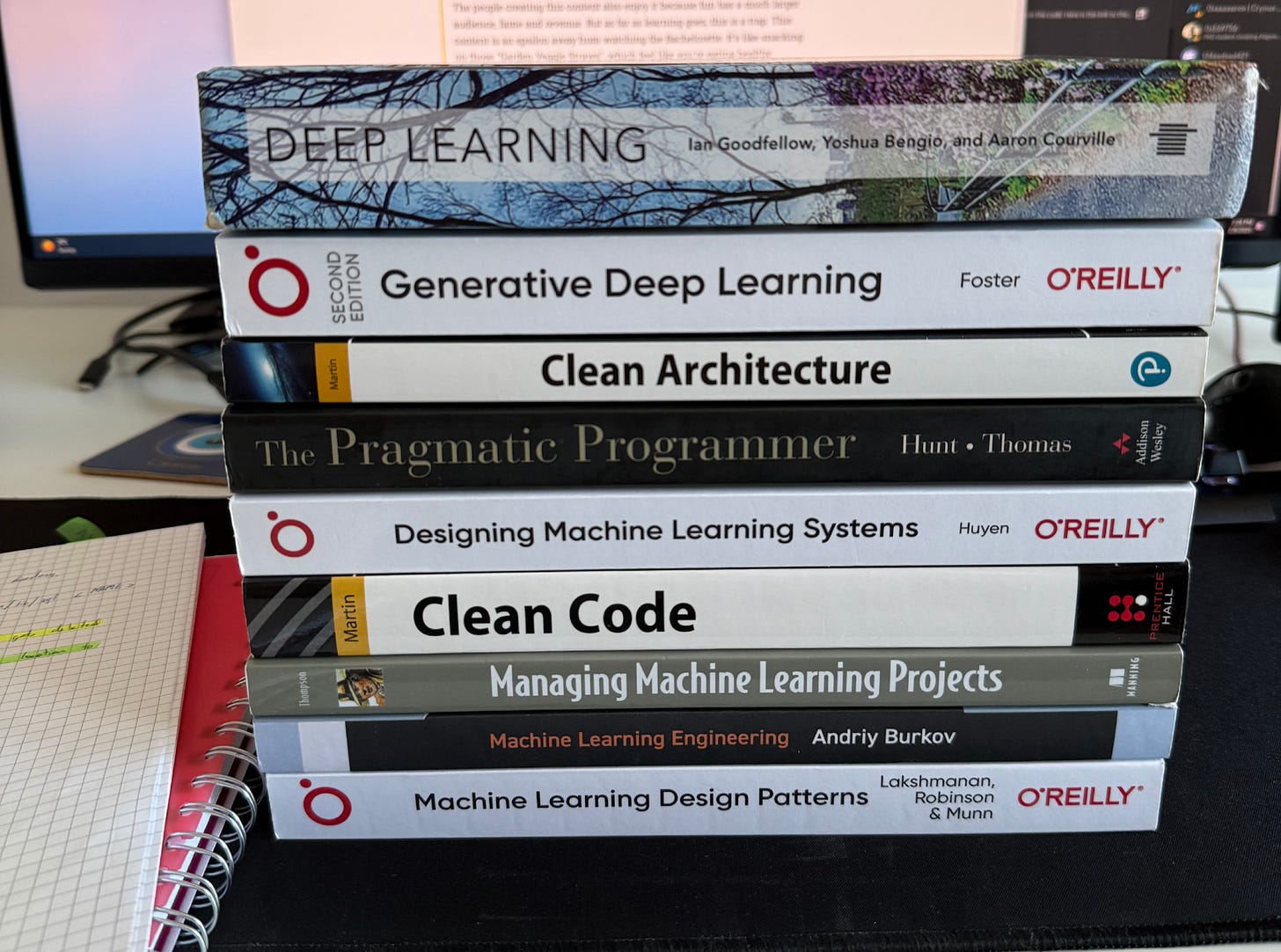
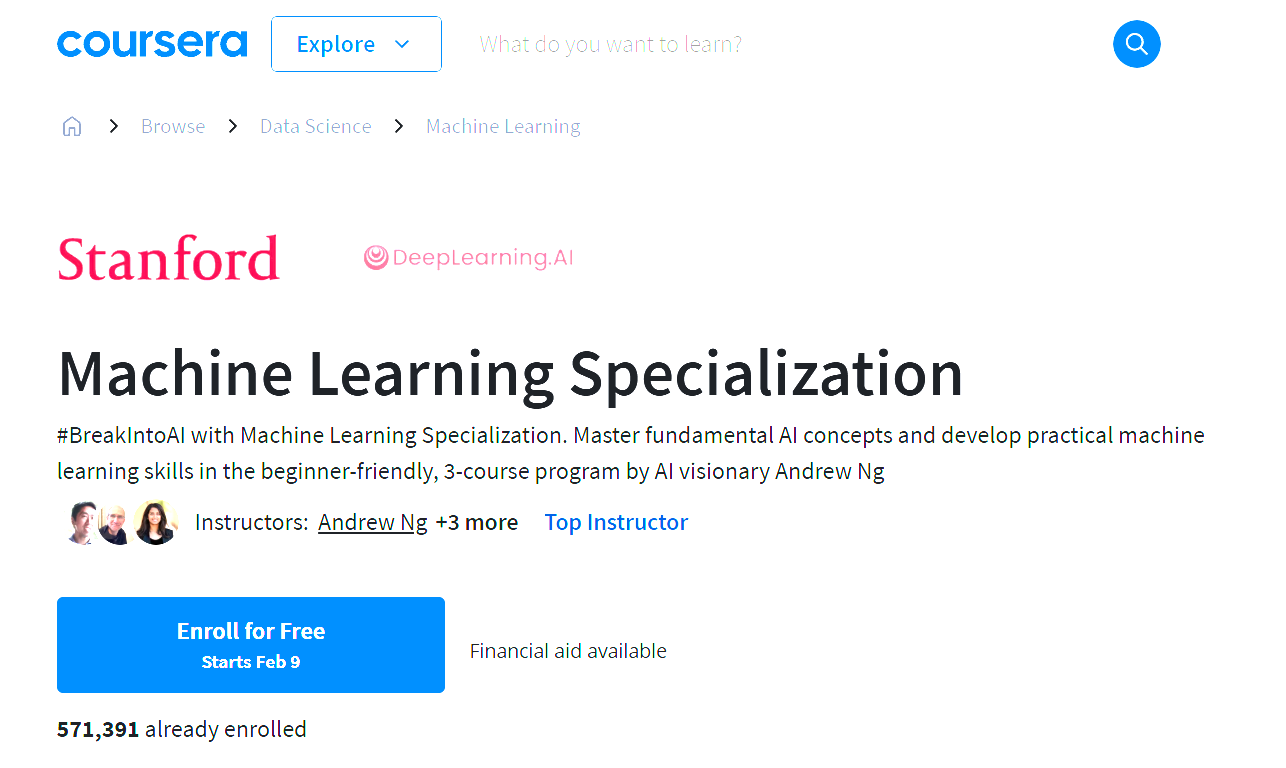
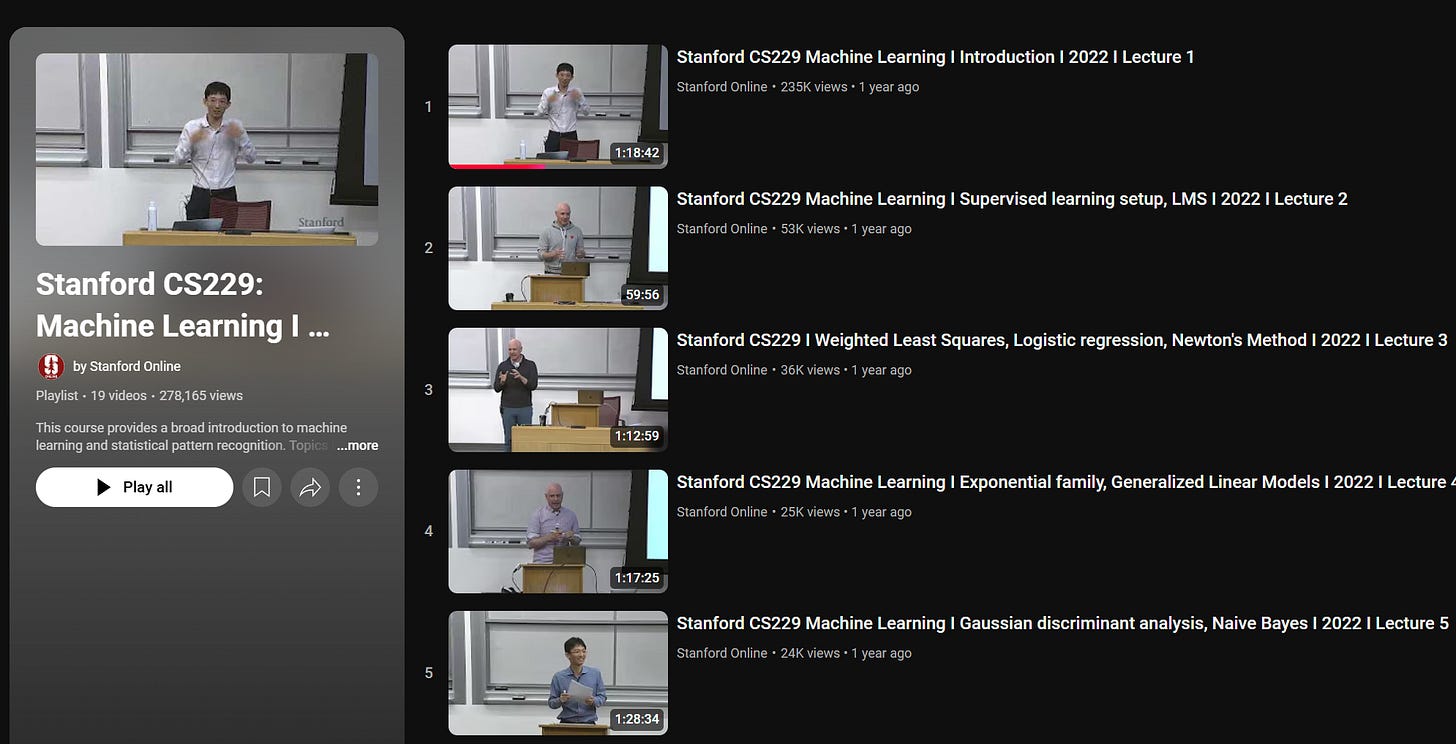
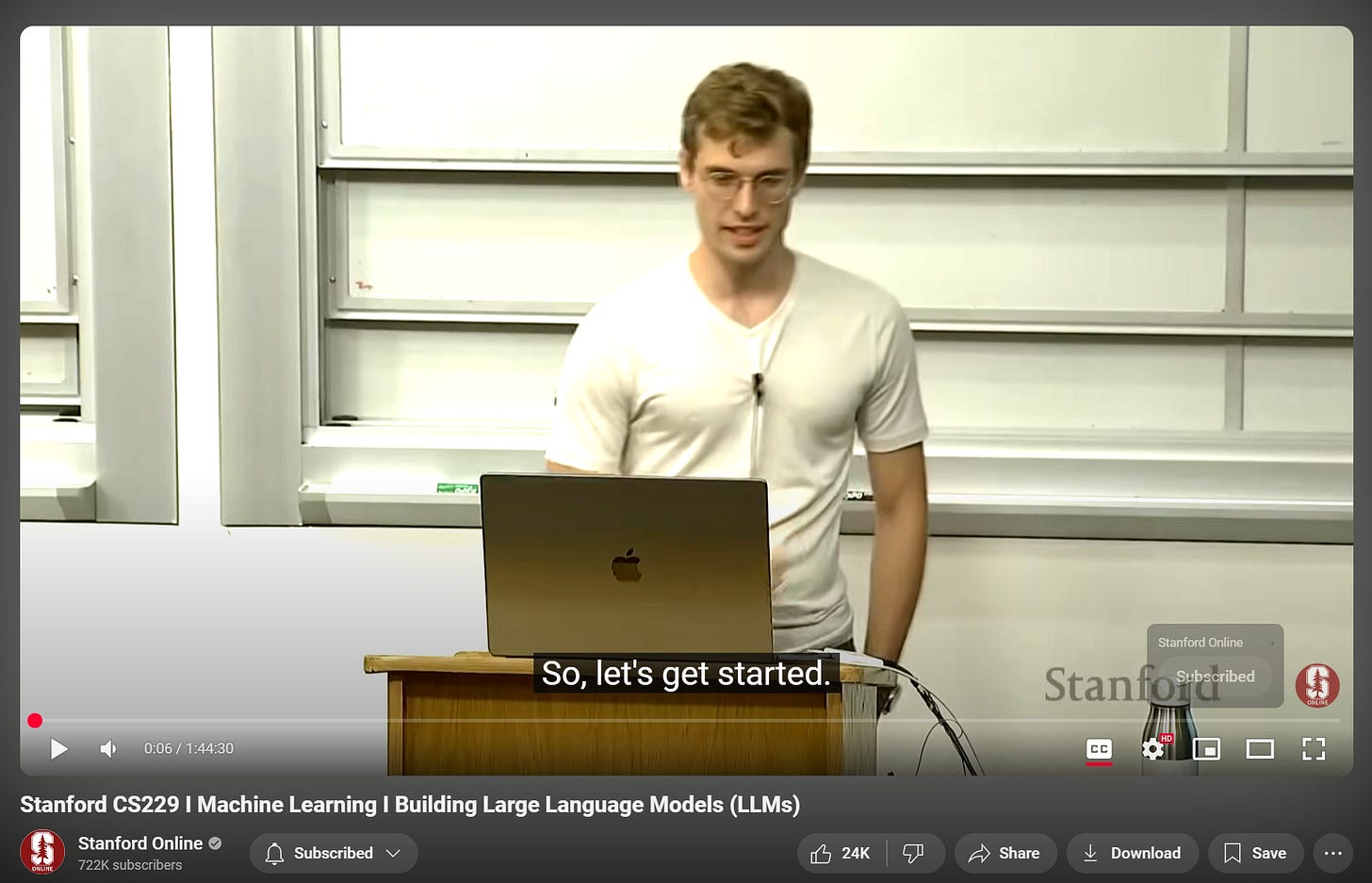
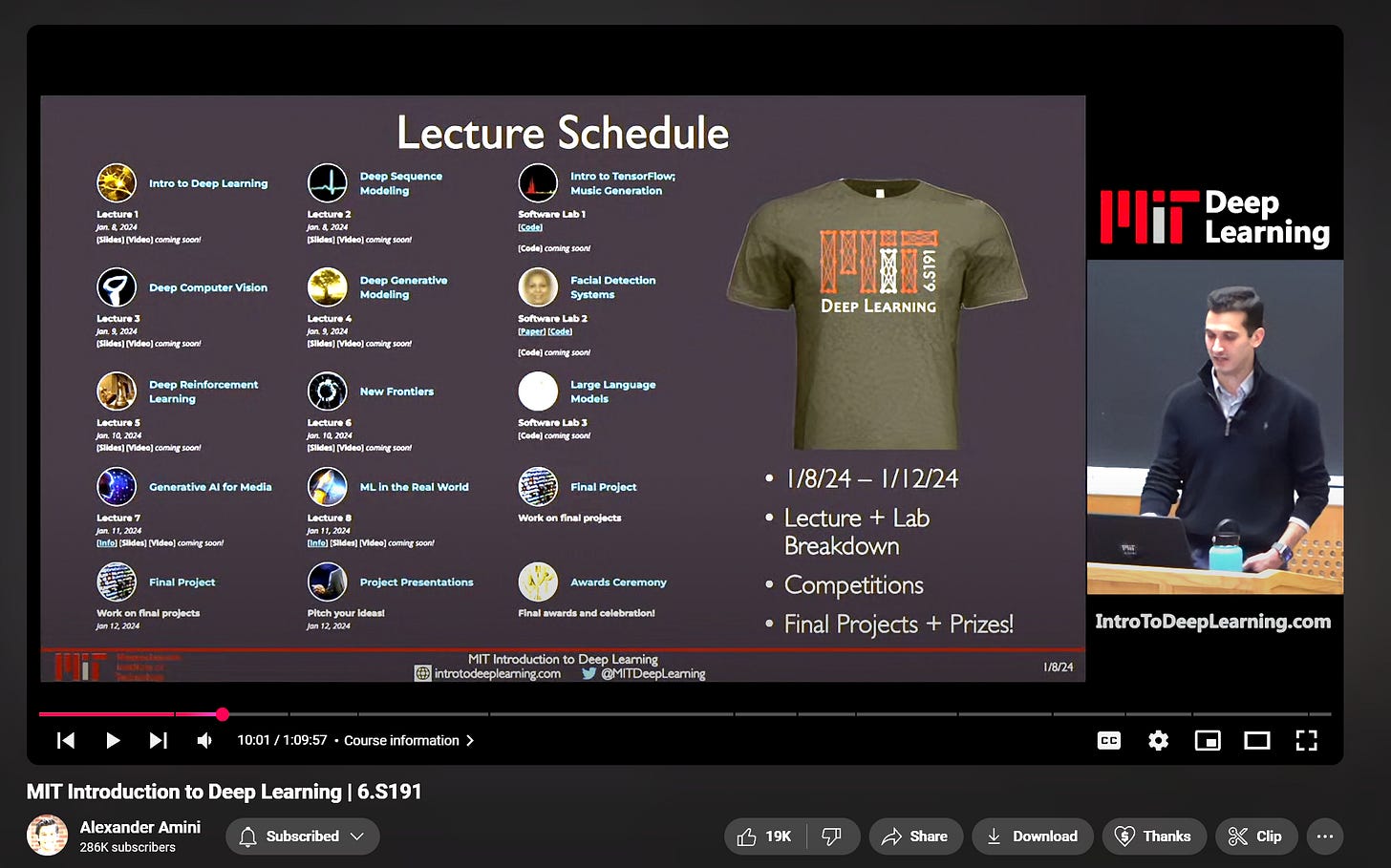

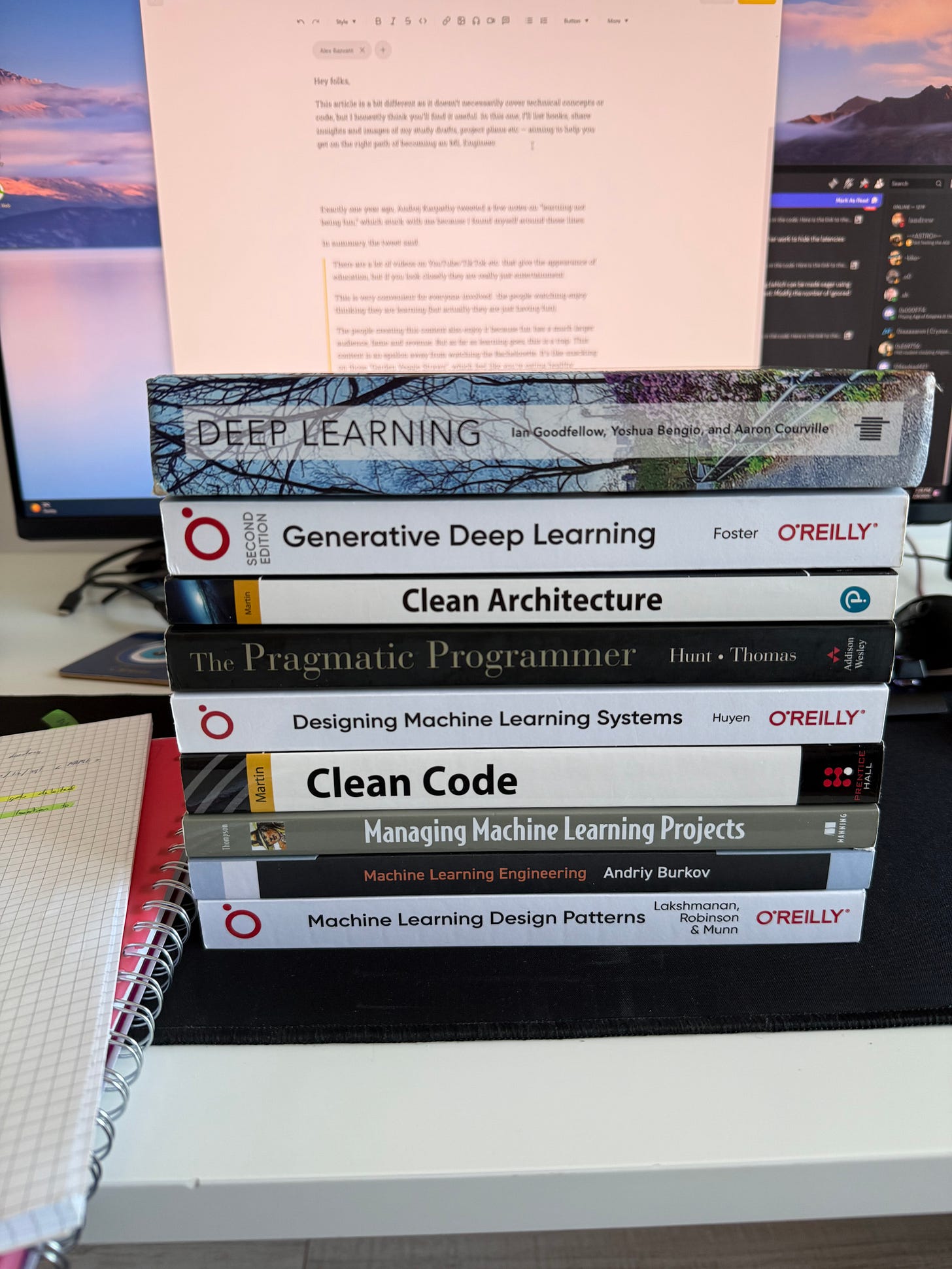
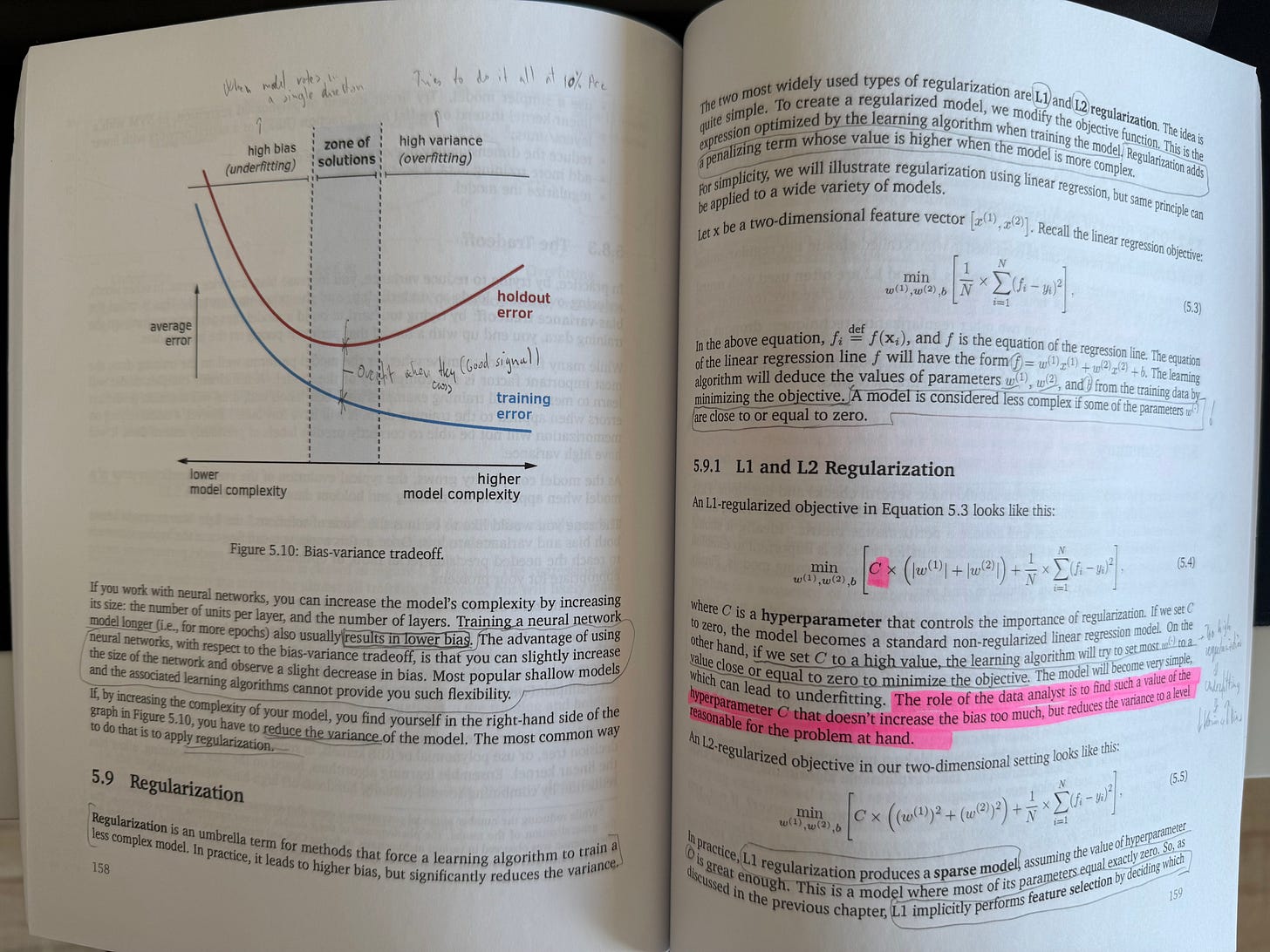
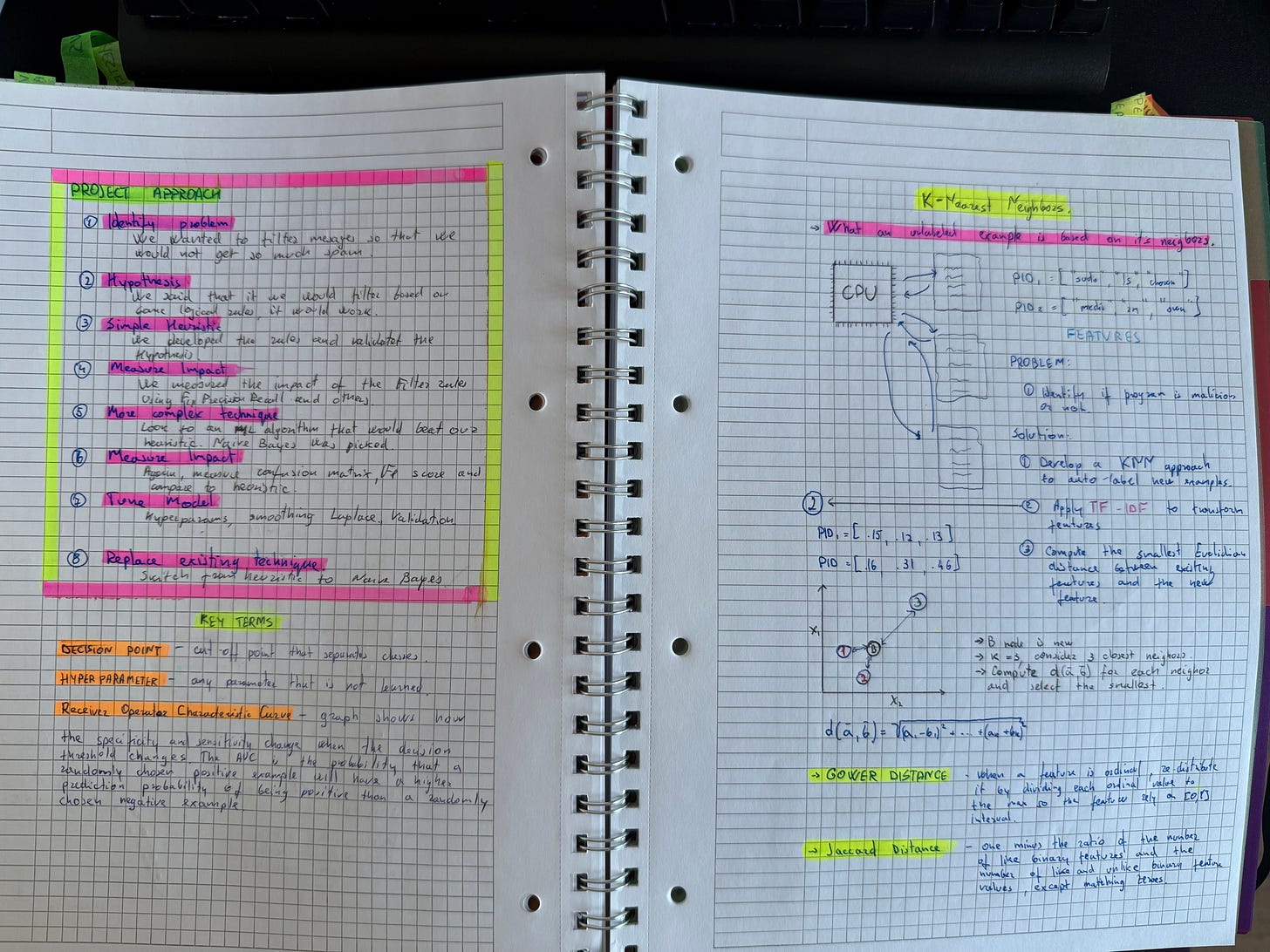
Curiosity should be driver. Learning and retention is just a side effect. Thats how you make it fun 🙂
Love this post man!!!